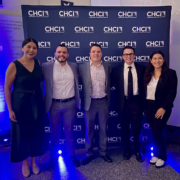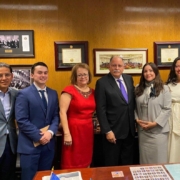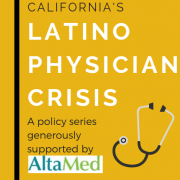UCLA LPPI Hosts 4th Annual Policy Briefing
UCLA LPPI Hosts 4th Annual Policy Briefing
By Cesar Montoya
Since the UCLA Latino Policy & Politics Institute launched, it has worked to ensure that Latino voices are front and center in policy discussions and that our state leaders know that every issue is a Latino issue. Last month, as the state legislature and governor debated budget priorities, the UCLA Latino Policy and Politics Institute (UCLA LPPI) brought policy experts, advocates, and legislative staff together for its 4th Annual Policy Briefing in Sacramento. To a packed room with over 20 legislative offices and community partners represented, UCLA LPPI experts presented research and critical insights on some of the most pressing issues affecting the Latino community in California. Through a series of presentations, legislative and advocacy partners delved into housing insecurity, COVID’s impact on youth transitioning into adulthood and the implementation of Medi-Cal expansion to undocumented residents.
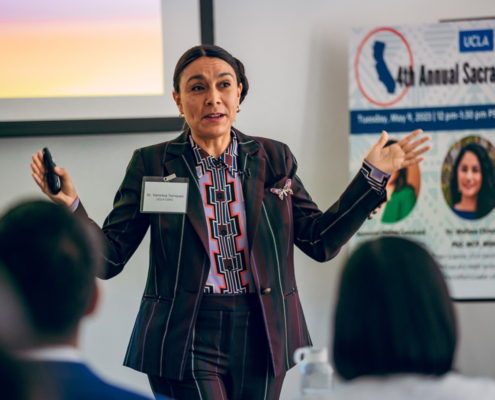
Dr. Veronica Terriquez UCLA CSRC
UCLA LPPI Advisory Board Member, and Altamed Health Service Vice President of Government Relations, Berenice Nuñez Constant moderated the briefing, which featured UCLA LPPI Experts Dr. Veronica Terriquez, Dr. Melissa Chinchilla and Dr. Arturo Vargas Bustamante. Nuñez Constant expertly led the convening, drawing on her extensive experience supporting health needs for Latino communities, from engagement to healthcare access.
Dr. Terriquez, director of the UCLA Chicano/a Studies Research Center, kicked off the expert research presentations with a focus on youth transitions to adulthood during the COVID-19 recovery. Dr. Terriquez has centered her research on various topics, including youth transitions, civic engagement, social inequality and immigrant integration. During her presentation, she shared sobering statistics about how the pandemic impacted Latinx youth’s economic stability, education rates and voting trends. She shared that based on her recent surveys, “one in three community college student Latinas is caring for senior citizens or young children” and that these young Latina college students often serve as the new safety net for their families. She further noted that families’ reliance on these young women results in more significant difficulties for Latinas seeking to transfer to a four-year college program and complete their degrees. Dr. Terriquez also shared that Latinx youth voter participation dipped during the pandemic. During the most recent midterm election in 2022, for voters between 18-34, only 22% of Latinx voters participated, compared to 39% of their non-Latinx counterparts. Dr. Terriquez concluded by emphasizing how these sobering statistics speak to the need to create targeted support systems for Latino youth, such as investing in nonpartisan engagement efforts that dispel myths, educate new voters, and strengthen the connection between youth and their local communities.
UCLA LPPI faculty expert Dr. Melissa Chinchilla then presented on Latino homelessness: a growing crisis for California municipalities. Her presentation focused on the rise in Latino homelessness and offered policy recommendations to address some of the underlying housing services issues. Given the large undercount of homelessness amongst the Latino community, briefing attendees considering affordable housing solutions in their respective communities across the state found Dr. Chinchilla’s presentation particularly engaging. After the briefing, Dr. Chinchilla shared, “As a researcher, I strive to inform the development of evidence-based practices that will lead to tangible improvements in our communities. This year I was able to share our work on Latino homelessness and uplift central policy solutions to ensure that government serves our communities equitably.” She added, “Research should not exist in a vacuum, and UCLA LPPI’s Annual Policy Briefing is a critical forum for us to ensure that our research is translated into policy impact.”
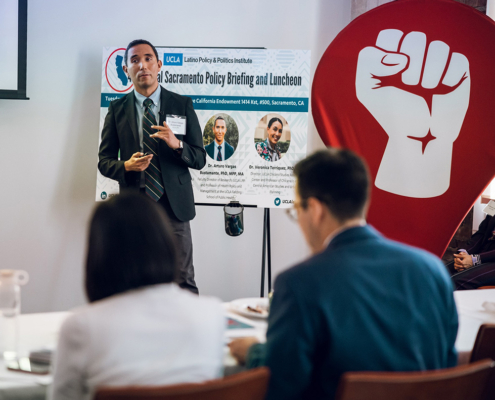
Dr. Arturo Vargas Bustamante
Finally, UCLA LPPI Faculty Director of Research Dr. Vargas Bustamante closed out the day with a discussion on implementation issues related to Medi-Cal expansion to undocumented adults aged 50 and up. In his presentation, Dr. Vargas shared why the expansion of coverage is so vital to the state and how delays in implementation will impact the health of the state’s older Latinos. In reflecting on the importance of these conversations, Dr. Vargas Bustamante said, “This policy briefing enabled us to highlight the significance of looking at the wellbeing of older immigrants as an integral part of California’s economy and society. Expanding Medi-Cal to older undocumented immigrants balances health equity and economic opportunity, ensuring that age and legal status are not barriers to care.”
After an engaging day of dialogue, Briefing participants walked away with robust policy recommendations and action items that can bring about transformative change for the Latinx community and other communities of color throughout California.
Click here to view video highlights from the day and here to view a photo gallery.


